The way we make choices is changing, partner. AI ain’t just crunching numbers and sorting spreadsheets—it’s getting its hands in the messy business of human judgment. Some folks fear it’s takin’ over our choices, while others reckon it’s fixing the blind spots we’ve always had. That’s the trail we’re ridin’ in this nine-part series, looking at how AI is shaping decision-making across all walks of life.
In Part 4, we’re sitting down with Dr. Amina Patel, a behavioral economist who’s made it her mission to root out the biases that warp human thinking. She argues that our choices ain’t nearly as rational as we like to believe—confirmation bias, heuristics, gut instincts, they all get in the way. But with AI, she sees a chance to cut through the fog, helping us make better, clearer, fairer decisions.
But can AI really make us smarter, or are we just handing over the reins to an algorithm? Can it correct human bias, or will it just learn to mimic our worst tendencies? And is there ever a time when irrationality is worth holding onto? Well now, let’s find out.
Memetic Cowboy (MC): Dr. Patel, reckon I’ve seen a fair share of bad decisions out on the frontier—folks going all-in on a busted hand, backing the wrong horse, trusting the wrong fella. But you say the biggest enemy ain’t luck or fate—it’s bias. So let’s start there. What are the worst biases clouding human judgment?
Dr. Amina Patel (AP): Bias is not just an obstacle to good decision-making—it is the silent architect of most human errors. It shapes our choices before we’re even aware a decision is being made. Some of the most insidious cognitive biases include confirmation bias, where we seek out information that reinforces our existing beliefs, and the availability heuristic, which tricks us into overestimating the importance of recent or emotionally charged events. This is why people fear rare but dramatic events, like plane crashes, while underestimating the mundane but deadly, like heart disease [1].
Another significant distortion is anchoring bias, where the first piece of information we encounter disproportionately influences our decisions, regardless of its relevance. A classic example is price negotiations—the first number mentioned becomes the reference point, even if it’s arbitrary. Then there’s self-serving bias, where individuals attribute success to their own abilities but blame failures on external circumstances. It’s why executives take credit for a booming stock price but blame market conditions when it crashes [1].
These biases aren’t random flaws; they’re cognitive shortcuts that evolved to help us navigate an uncertain world. But in complex decision-making—business, medicine, policy—they often lead us astray.
MC: Sounds like a rough way to navigate. But that’s where AI comes in, right? You reckon it can help folks see past their own blind spots?
AP: Exactly. Unlike humans, AI doesn’t succumb to cognitive fatigue, emotional attachments, or overconfidence. It evaluates data objectively, identifies patterns we overlook, and provides insights untainted by personal bias.
In hiring, AI has been used to anonymize resumes, reducing gender and racial bias—something human recruiters often struggle with, even unconsciously [2]. In medicine, AI models improve diagnostic accuracy by analyzing vast datasets, avoiding the pattern-recognition errors that lead doctors to misdiagnose conditions based on familiarity rather than probability [3]. And in finance, AI helps investors counteract herd mentality, ensuring decisions are based on long-term strategy rather than emotional reactions to market fluctuations [4].
The real power of AI isn’t that it ‘knows’ more than us—it’s that it sees through us, correcting for distortions in judgment we don’t even realize we’re making.
MC: Now hold on, I know that tone—you’re about to say there’s a catch.
AP: Indeed. AI is only as good as the data it learns from. And therein lies the paradox—if it’s trained on biased data, it won’t eliminate bias; it will amplify it.
Take facial recognition technology. Many systems initially performed significantly worse on non-white faces because they were trained on datasets that were overwhelmingly composed of lighter-skinned individuals [5]. Or consider Amazon’s AI recruiting tool—it had to be scrapped after it started favoring male candidates because historical hiring data reflected a male-dominated workforce [6].
Bias in AI is not an abstract risk—it is a measurable, real-world problem. This is why AI systems must be subject to continuous scrutiny, incorporating diverse training datasets and ethical oversight. Without intervention, AI won’t correct our biases; it will institutionalize them.
MC: So AI’s gotta be kept on a short leash—makes sense. But let me ask you this: is bias always bad? Ain’t there times when so-called ‘irrational’ decisions turn out to be the right ones?
AP: That’s where we must be careful in distinguishing between bias and intuition. Not all deviations from pure rationality are detrimental.
For example, in creative problem-solving, irrational leaps can lead to breakthroughs. A machine trained purely on logic may never have conceived of surrealist art, jazz improvisation, or the concept of relativity. Einstein famously relied on ‘thought experiments’—intuitive leaps before the math caught up [7].
Similarly, in high-pressure situations, heuristics can be life-saving. A firefighter doesn’t have the luxury of deliberation when deciding whether a structure is about to collapse. Quick, experience-based intuition often outperforms slow, deliberate reasoning in time-sensitive environments [8].
That said, these moments are the exception, not the rule. The vast majority of biases lead to suboptimal choices. AI’s role is not to eradicate intuition but to help us discern when to trust it and when to override it with rational analysis.
MC: Alright, last question for you, Doc. If everybody started using AI for all their big decisions, what kind of world would we be living in?
AP: That depends entirely on how AI is integrated into decision-making.
A world where AI is used intelligently—as an augmentation rather than a replacement—could be profoundly beneficial. We would see fairer hiring, more accurate medical diagnoses, more efficient allocation of resources. Decision-making would become more data-driven, less prone to human error, and, in many cases, more ethical.
But there’s another possibility: over-reliance. If people begin deferring to AI in all matters, we risk eroding human agency. Imagine a world where no one makes personal choices—where algorithms determine career paths, life partners, and political beliefs. That is not an abstract dystopia—it’s already happening in microcosm, from AI-curated news feeds shaping public opinion to predictive policing reinforcing systemic inequalities [9].
The key, Cowboy, is balance. AI is a tool, not an oracle. The danger is not in its intelligence but in our willingness to outsource critical thinking to it entirely. We must remain vigilant, using AI to enhance human judgment—not replace it.
MC: Dr. Patel, much obliged for riding this trail with me today. You’ve laid it out plain—bias ain’t just a flaw, it’s the foundation of how we think. But AI’s got the potential to help us see past our own blind spots, if we use it right. Course, the trick is making sure it don’t pick up our bad habits instead of fixing them. Balance, like you said. A tool, not an oracle. Reckon that’s a lesson worth remembering.
But we ain’t done riding yet, folks. Next time, we’re sitting down with Diego Lázaro, a biohacker who sees AI not as a rival, but as the next step in human evolution. While some folks fear losing autonomy, Diego reckons the real future ain’t man or machine—it’s the two working as one. AI as an extension of human intelligence, not a replacement. So what happens when the boundary between mind and machine starts to blur? And is that a future to embrace or fear? Well now, saddle up, because this next ride’s takin’ us straight into the frontier of transhumanism.
References
[1] Verywell Mind. 13 Types of Common Cognitive Biases.
[2] McKinsey. Tackling Bias in Artificial Intelligence (and in Humans).
[3] IBM. Shedding Light on AI Bias with Real-World Examples.
[4] MIT Sloan Review. The Human Factor in AI-Based Decision-Making.
[5] Levity. AI Bias - What Is It and How to Avoid It?
[6] DigitalOcean. Addressing AI Bias: Real-World Challenges and How to Solve Them.
[7] Wikipedia. Einstein's thought experiments[8] Harvard Business Review. How AI Will Change the Way We Make Decisions
[9] Brookings Institute. Algorithmic Bias Detection and Mitigation.









